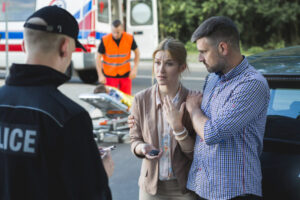
Car accidents are an unfortunate reality, with millions of people involved in motor vehicle collisions every year. Determining fault after a car accident can be a complicated process, especially when emotions are running high.
One common dilemma that arises after an accident is whether or not to admit fault at the scene.
Determining Fault and the Importance of Evidence

Establishing blame in a car accident is crucial because it decides which insurance company pays for the damages and impacts legal outcomes in cases involving injuries or property damage.
The necessary steps to prove fault vary depending on each accident’s specifics. Still, the most crucial aspect is gathering strong evidence to support your claim.
In most car accidents, one party is usually held responsible for causing the collision. Determining fault involves a careful examination of the circumstances leading up to the crash, such as each driver’s actions, road conditions, and traffic laws. In some cases, more than one party may share fault for the accident.
The following are some essential pieces of evidence that can be used to prove fault in a car accident:
- Police Reports – Contact the police immediately after an accident. The report they provide contains useful information, including the officer’s viewpoint on who was at fault based on their observations and evidence found at the scene.
- Photos and Videos – The saying “a picture is worth a thousand words” holds true in accident scenarios. Taking photos or videos of the accident scene, the damage to both vehicles, and any relevant road markings or signs can be crucial in proving fault.
- Witness Statements – Neutral third-party witnesses can provide critical information to support your version of what happened. Collecting their contact information and statements can be vital for your case.
The Importance of Not Admitting Fault After a Car Accident
Car accidents are often complex situations with many factors and variables at play. Admitting fault immediately after an accident is a bad idea for several reasons:
Insurance Implications
Insurance companies use accident details and statements to determine fault and assign liability for damages. By admitting responsibility, you may risk not only higher insurance premiums but also forfeiting insurance coverage for damages sustained in the accident.
Legal Ramifications
It is crucial to remember that anything you say at the scene of an accident can be used against you in a court of law. Admitting fault may inadvertently provide the grounds for legal action, like criminal charges in some cases.
Unreliable Perspective
Immediately following an accident, our ability to accurately recall the details may be impaired by adrenaline and emotion, causing us to be unsure of all contributing factors. Admitting fault before fully understanding the situation can cause long-term issues – and you may not even be correct.
Tips for Handling the Aftermath of a Car Accident
Instead of admitting fault, follow these tips to ensure the best outcome for everyone involved in the car accident:
- Stay calm: Take a deep breath and compose yourself. Avoid making any rash decisions or statements.
- Check for injuries: Prioritize the safety of all parties involved by checking for any injuries and contacting emergency services if necessary.
- Exchange information: Exchange contact and insurance information with the other parties involved in the accident.
- Document the scene: Take photos and videos of the accident scene, including damage to the vehicles, road conditions, and traffic signs.
- Speak with your insurance company: Contact your insurance company as soon as possible to report the accident and provide the necessary documentation.
Additionally, you should seek legal advice. It’s always a good idea to speak with a personal injury lawyer to explore your options.
How a Personal Injury Lawyer Can Assist You After a Car Accident
Here’s how a lawyer can help you after a car accident:
- Gathering Evidence: A thorough investigation of the accident is crucial, and your lawyer will know where to find the most pertinent evidence to strengthen your case. This could include obtaining the police report, gathering witness statements, reviewing surveillance footage, or even reconstructing the accident scene.
- Handling Insurance Company Negotiations: Insurance companies are known for trying to minimize payouts, but a skilled lawyer will be able to negotiate on your behalf and pursue the compensation you deserve.
- Analyzing Medical Records: A lawyer can help you determine whether your injuries were caused by the accident and help explain why you deserve compensation as a result.
- Fighting in Court: If your case goes to trial, your lawyer will prepare and present your case directly to the judge and jury to help ensure a fair and just outcome.
- Providing Expert Testimony: In some cases, having an expert testify on your behalf can be the deciding factor that shifts the case in your favor. Your lawyer will be able to connect you with the best professionals for your situation.
Admitting fault after a car accident can have serious consequences, both legally and financially, making it essential to know what to say and what not to say. If you need help, contact an experienced personal injury attorney from Runion Personal Injury Lawyers by calling (602) 600-9000 for a free consultation.

